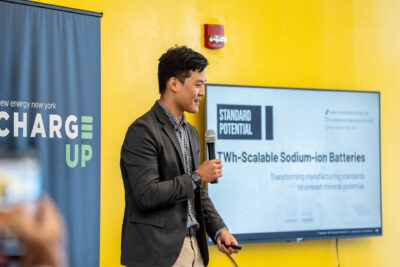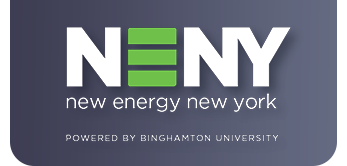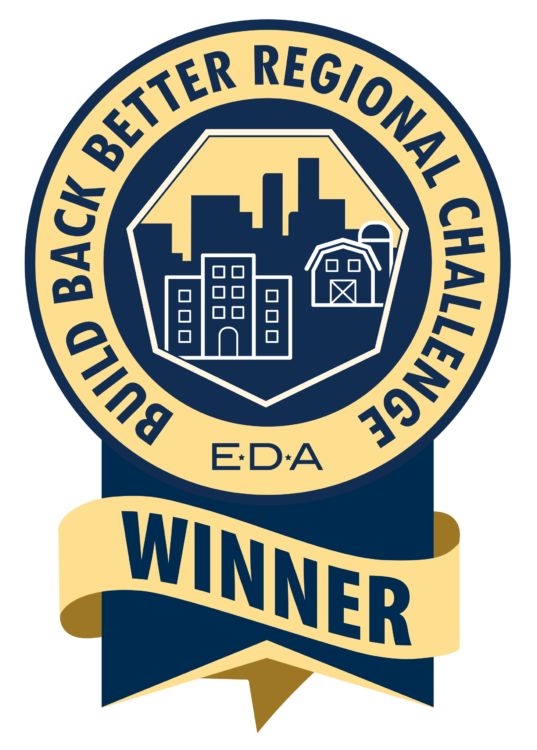Standard Potential stores energy based on the earth’s abundance
By Jonathan Everitt
Founded in 2023 by Andrew Wang and Richard May, Standard Potential began with a goal to use sodium-ion technology to address challenges in lithium-ion battery manufacturing, thereby reducing the cost and the need for scarce raw materials typical of batteries today. By connecting with New Energy New York’s ChargeUp program — the nation’s first battery-focused business accelerator — the company is quickly transforming its vision into a reality.

The company, based in Westchester, N.Y., developed a sodium-ion battery technology that uses abundant minerals to improve sustainable energy storage and do so on a larger scale.
Batteries are central to the transition to renewable energy. While lithium-ion batteries have reached large-scale production, they’re limited by the scarcity of lithium, long-term performance, cost and safety. Standard Potential is looking to change that with its technology, which is based on sodium ions instead.
“When we first started out, our driving force was finding technology based on materials that are abundant to societies around the world,” says co-founder Andrew Wang.
There is plenty of sodium around the world, so it can be deployed for a lower cost and a smaller plant footprint than current technology can. The result: streamlined battery manufacturing that’s less expensive. Sodium-ion batteries have the potential to make that happen — all in the service of decarbonization and electrification of industries shifting to battery power, such as the automotive business.
The missing element: business connections
Wang and co-founder Richard May have been in the battery business in New York state since their work began at Columbia, and they were already aware of New Energy New York (NENY). So, when they saw the ChargeUp program announced, they saw a perfect fit for their fledgling business.
“I was a post-doctoral researcher at Columbia University with my co-founder, Richard, and we developed some core technology through the Department of Energy’s ARPA-E program that showed great potential. So, we decided to spin it out into its own startup,” Wang says.
Like many entrepreneurs in highly specialized fields, the co-founders had deep experience in their area of science but were less experienced in the ways of business.
“At the very beginning, we were very much all scientists, so ChargeUp helped fill in some important knowledge areas,” Wang says. “The program offered us a curriculum around customer discovery and best practices in business operations. It helped us flesh out our capabilities to grow.”
Knowing their market and connecting with experts
The support from ChargeUp included helping the company find out who their most likely first adopters would be so it could plan a more effective communication strategy.
ChargeUp also connected the Standard Potential team with battery industry experts to consult as it developed its plans.
“The battery industry is very dynamic right now,” Wang says. “It’s so valuable to have companies in the battery space [to be] able to confer with through ChargeUp.”
A space to prove their product claims
One of the most important aspects of Standard Potential’s work is proving their product safety claims. ChargeUp has connected them with the right contacts across the New York state battery industry to help them quantify the safety benefits of their sodium ion batteries.
Specifically, ChargeUp introduced the team to the quality assurance experts at Intertek in Cortland, where they toured the facility’s safety-testing space and discussed how Intertek could meet Standard Potential’s needs. Standard Potential also connected with the product testing facilities at Rochester Institute of Technology’s Battery Development Center through their contacts at ChargeUp.
And as their team grew to four people, ChargeUp was by their side to guide their adoption of important administrative practices for employers.
Dramatic progress in less than a year
Standard Potential has advanced by leaps and bounds in the short time since it incorporated in 2023 — particularly in the roughly six-month period it worked with ChargeUp. It’s now working on building its customer base.
“We’ve been able to bring in early contracts on the batteries we’re developing,” Wang says.
The funding is beginning to come through, too. While ChargeUp was the first accelerator-funding that Standard Potential earned, the company has now raised more than $1 million in non-dilutive funding, thanks in part to the pitch skills it honed during the program.
“ChargeUp puts a lot of emphasis on how to pitch to investors,” Wang says, “Their expertise is helping us raise our first external capital financing.”
And with a new 1,000-square-foot lab in place, it’s on its way.
Ready to go big
From the beginning, the vision for Standard Potential has been to figure out the best way to apply their technology to address the need for abundant energy storage. Today, it has advanced from building a small prototype (think of a watch battery) to manufacturing larger products in greater quantities.
“We can now produce 100 batteries per week, each about the size of a soda can,” Wang says.
Still in the validation phase, the company currently has pilot customers across the U.S., with plans to go global in in the long term.
“There’s sodium all around the world, so it’s not geographically or geologically constrained like lithium,” Wang says.
An ideal relationship for battery-focused business
ChargeUp came along at just the right moment for Standard Potential to pursue its promise.
“There’s really only one ChargeUp,” Wang says. “And the battery landscape is really dynamic right now in terms of the emerging players and incumbents, so working with ChargeUp gave us a significant advantage.”
He encourages his peers to consider the accelerator, too.
“ChargeUp provides a platform with fellow founders across different aspects your businesses, where everyone has a different piece of the puzzle, so you can cross-test of your technologies,” Wang says.
And with Standard Potential on its way to more scaling, lab growth and product development, “accelerator” is an apt word for ChargeUp.
“We learned just how much you can accomplish in six months.”





